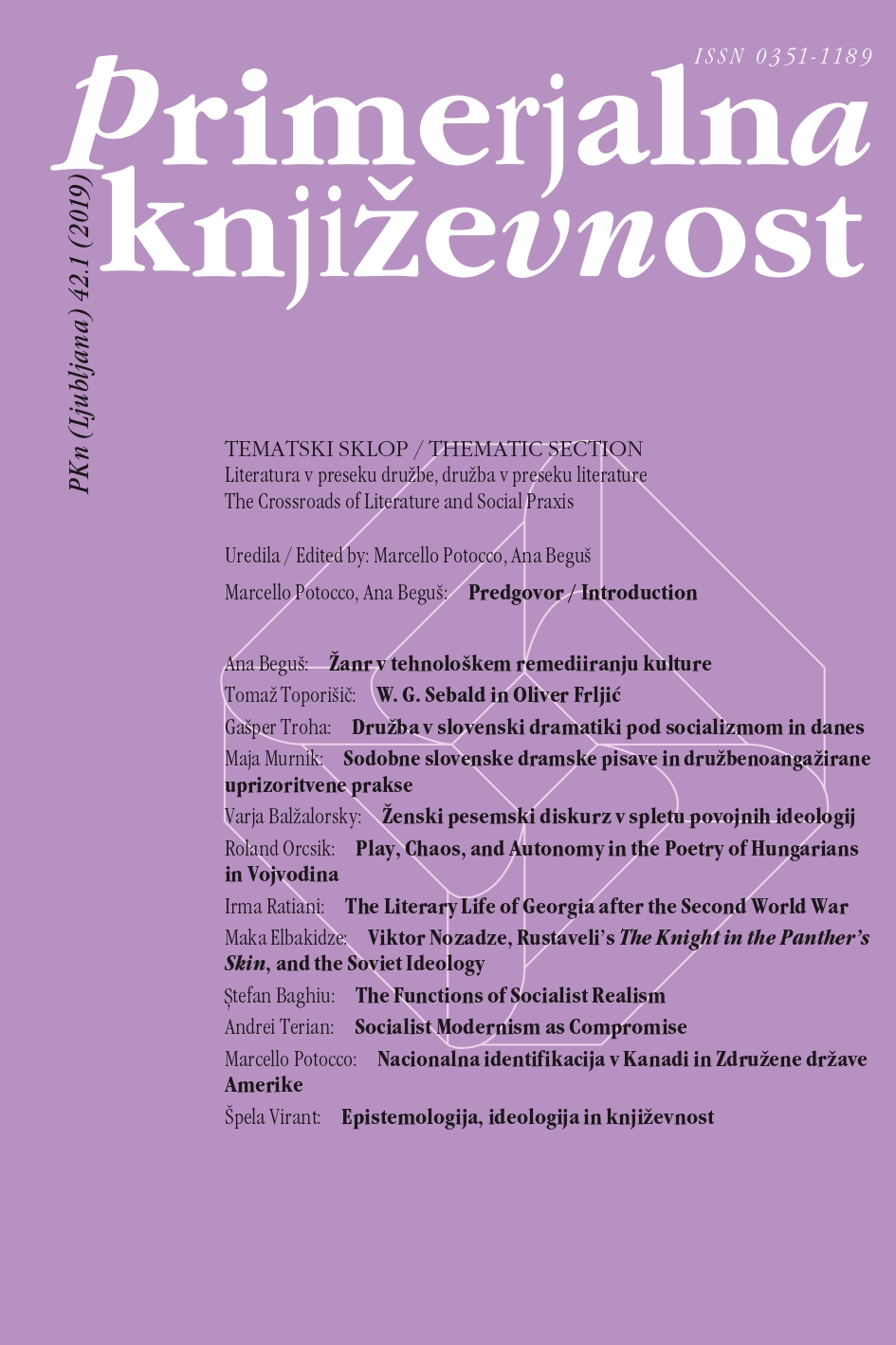Play, Chaos, and Autonomy in the Poetry of Hungarians in Vojvodina (Új Symposion)
Keywords:
literature and ideology, Yugoslavia, Yugoslav literatures, Vojvodina, Hungarians, minority culture, experimental art, ludism, Új SymposionAbstract
The study presents one of the most significant ex-Yugoslav poetry styles after the Second World War – ludism – in the context of Hungarian authors from Vojvodina gathered around the literary magazine Új Symposion (1965–1992, Novi Sad). They were under the pressure of the ambivalent political ideology of SFR Yugoslavia. Hungary has no tradition of ludism, which is one of the significant differences between the poetry of Hungarian poets in Hungary and those in Vojvodina (Serbia) in the period after the Second World War. The study shows the main poetical characteristics of ludism, its South Slavic authors (Tomaž Šalamun, Iztok Geister Plamen, Ivan Slamnig, Branko Maleš, Delimir Rešicki, Vojislav Despotov, Vladimir Kopicl, Vujica Rešin Tucić etc.), and the works of Hungarian “Symposionists” (István Domonkos, Katalin Ladik, Ottó Tolnai, Ottó Fenyvesi). The ludism was accused of blurring the borders between popular culture, subculture, alternative and high culture. The study shows the artistic results of this method (e.g. the poetics of video and collage). The Symposionist authors were accused of being “cosmopolitans”, “anarchists”, “nihilists” and similar by the officials in Vojvodina. The art of Symposionists did not change the political system of Vojvodina during the period of SFRY and after it but it did provide an alternative space for artistic freedom.References
Bagić, Krešimir. Živi jezici. Poetska pisma Ivana Slamniga, Josipa Severa i Anke Žagar. Zagreb: Naklada MD, 1994.
Baráth, Ferenc. “Rusztikus háttér.” Interview by Géczi János. Ex Symposion 98 (2017): 26–34.
Bošnjak, Branimir. Proizvodnja života. Zagreb: Stvarnost, no date.
Caillois, Roger. Man, Play and Games. Translated by Meyer Barash. Urbana and Chicago: University of Illinois Press, 2001.
Csorba, Bélá. “Mi voltunk a tagadás tagadásának tagadása.” Interview by Kocsis Árpád. Ex Symposion 98 (2017): 45–52.
Dánél, Mónika. Nyelv-karnevál. Magyar neovantgárd alkotások poétikája. Budapest: Kijárat, 2016.
Dedić, Nikola. “Neoavangardni tekstualizam.” Evropski konteksti umetnosti XX veka u Vojvodini. Eds. Miško Šuvaković and Dragomir Ugren. Novi Sad: Muzej savremene umetnosti Vojvodine, 2008. 595–602.
Donat, Branimir (ed.). Književna kritika o Ivanu Slamnigu. Zagreb: Matica hrvatska, 2004.
Đurić, Dubravka. All–Over. Izabrane i nove pesme sa esejima koji određuju fazu moje poezije od 1996–2004. Beograd: Feministička 94, 2004.
Faragó, Kornélia. “Affinitások és koncepciók (Képzőművészeti gondolkodás az Új Symposionban).” Tiszatáj 6 (2018): 53–62.
Huizinga, Johan. Homo Ludens: A Study of the Play-Element. Transl. by the author. London, Boston and Henley: Routledge, Kegan & Paul, 1980.
Katalin Keményné, Pálffy. “A szociális tanulás.” Pszichológia szöveggyűjtemény óvodapedagógus hallgatóknak. Eds. B. Lakatos Margit and Mónika Serfőző. Budapest: Trezor Kiadó, 2002. 189–196.
Kermauner, Taras. “Fragmentarni prilozi povijesti i analizi konkretne poezije u Sloveniji.” Transl. by Ljubomir Stefanović. Vidik 7–9 (1972/73): 6–7.
Losonc, Alpar. “Multikulturalnost u ‘evropskom zajedničkom prostoru’: 1989 kao izvor mita.” Habitus 1 (1999): 85–116.
Mallarmé, Stéphane. Kockadobás. Transl. by Gyula Tellér. Budapest: Helikon, 1985.
Mrkonjić, Zvonimir. “Enciklopedijska natuknica. Konkretna poezija”. Vijenac 2008/378.
Oraić Tolić, Dubravka. “Ontološki ludizam”. Ludizam. Zagrebački pojmovnik kulture XX. stoljeća. Eds. Živa Benčić and Aleksandar Flaker. Zagreb: Zavod za znanost o knjiživenosti Filozofskoga fakulteta, 1996. 97–104.
Szerbhorváth, György. Vajdasági lakoma. Az Új Symposion történetéről. Poszony: Kalligram, 2005.
Szombathy, Bálint. Új idők, művészet. Újvidék: Forum, 1991.
Šuvaković, Miško. “Hijatusi jezika i transcendencije”. Slobodan Tišma. Vrt kao to. Izabrane pesme. Beograd: Ruža lutanja, 1997.
Šuvaković, Miško, and Dragomir Ugren (eds.). Evropski konteksti umetnosti XX veka u Vojvodini. Novi Sad: Muzej savremene likovne umestnosti, 2008.
Thomka, Beáta. Déli témák. Zenta: zEtna, 2009.
Vekerdy, Tamás. Gyerekek, óvodák, iskolák. Budapest: Saxum, 2016.
Virág, Zoltán. A szomszédság kapui. Zenta: zEtna, 2010.
Zabel, Igor. “Uloga igre u delu OHO”. Ludizam. Zagrebački pojmovnik kulture XX. stoljeća. Eds. Živa Benčić and Aleksandar Flaker. Zagreb: Zavod za znanost o knjiživenosti Filozofskoga fakulteta, 1996. 355–362.


